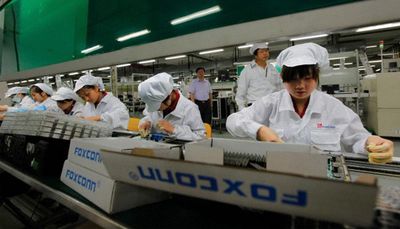Foxconn and Sharp are looking closer than ever to building a manufacturing plant within the United States, according to one Sharp executive who said that the plan is still "on the table" (via Nikkei). The plant would mainly be focused on the manufacturing of LCD panels for TV sets and home appliances, but Foxconn is said to be considering moving iPhone production stateside as well.
The news continues a rumor from last year born out of President-elect Donald Trump's comments on wanting Apple to make its products stateside. Foxconn laid out plans for such a move in December, along with Japan-based SoftBank Group, with each company hoping to create a combined 100,000 jobs in the U.S. over the next four years.

Nothing is yet official, however, and the same Sharp executive noted that "we will make a decision carefully."
Hon Hai Precision Industry and its Japanese subsidiary Sharp have begun studying the possibility of building a liquid crystal display panel plant in the U.S., a Sharp executive said Friday.
With Trump urging American manufacturers to bring operations back to the U.S., Hon Hai is considering production in the U.S. due to its huge market for TVs and other home appliances.
Although details about the cost of the plant and its location remain unspecified, people familiar with the plan said Foxconn would spend about the same amount on constructing the U.S. location as it did on a similar facility in Guangzhou -- around 1 trillion yen, or $8.69 billion.
As an incentive, Donald Trump in November told Apple CEO Tim Cook that he would offer the company a "very large tax cut" to make its products in the U.S. Cook was said to have remained largely neutral on the subject during his call with Trump, later pointing out that one of the major reasons Apple's manufacturing is so heavily centered in China is due to the country's large number of individuals with the required "vocational kind of skills."
Foxconn and Apple both have manufacturing facilities on a very small scale in the U.S., but the newly discussed facility by Foxconn and Sharp would be notably larger. Currently, Foxconn has plants in Virginia and Indiana, along with logistic locations in California and Texas. Apple has a comparably limited facility in Austin, Texas which manufactures the company's Mac Pro.
Note: Due to the political nature of the discussion regarding this topic, the discussion thread is located in our Politics, Religion, Social Issues forum. All forum members and site visitors are welcome to read and follow the thread, but posting is limited to forum members with at least 100 posts.





















Top Rated Comments
Yeah, we have no workers here who can stand on assembly lines I guess... just like Nike, they can find no workers here who can make sneakers... they are so damn hard to make I guess.
The only thing I can get on board with Trump is this whole MADE IN USA thing. These companies should realize that maximizing profit at the expense of the country's workers is NOT patriotic. Apple would still make billions and billions making products here, just not as much as making them in China. Tim cares about his company more than his country, that is the problem.
There is one major country who would want to interfere with a "make it in the USA" candidate, and it's not Russia.
This whole story seems like fluff to me though. In order to make it worthwhile manufacturing LCDs in the USA you also have to be manufacturing devices to use those LCDs. Otherwise you'll be making them in the USA, shipping them to SE Asia to be assembled into devices, then shipping them back to the USA for people to use. This might work if your customer base were automotive, ie the cars are largely maufactured in the USA, but I doubt that market segment alone would warrant the investment of an entire LCD plant.
Additionally, I'm not certain, but I believe there is a high degree of automation in the creation of LCD screens - it's unlikely that an LCD plant would actually result in many jobs.
[doublepost=1484333614][/doublepost]Isn't it clear enough that what the people have wanted for the past 20 or 30 years is cheap consumer goods (clothes, electronics, etc), the price that is ultimately paid for that is shipping the manufacturing base overseas (as true in North America as it is in Western Europe).
When the prices start going up in those emerging manufacturing centres we just get more expensive goods, but no jobs - because it is almost impossible to bring those jobs back again.
A defense attorney may represent a different type of client than a district attorney, but there is no inherent ethical compromise in doing so, unless the lawyer is ethically challenged to begin with. In both jobs, the lawyers attempt to represent the truth to the best of their abilities, and indeed are required by law to do so.
A CEO makes an ethical decision about where to manufacture goods -- pay more and make them in the US, pay less and ship the jobs offshore, or don't make that particular product at all. Hiding behind the shareholders as defense of ones actions is a cheat. That's like a prosecuting attorney taking a job defending the very client they were previously prosecuting, knowing the client was guilty despite beating the charges on a technicality, and claiming they have to defend the new client because it's their job. It starts with an ethical choice about whether to take the job in the first place.